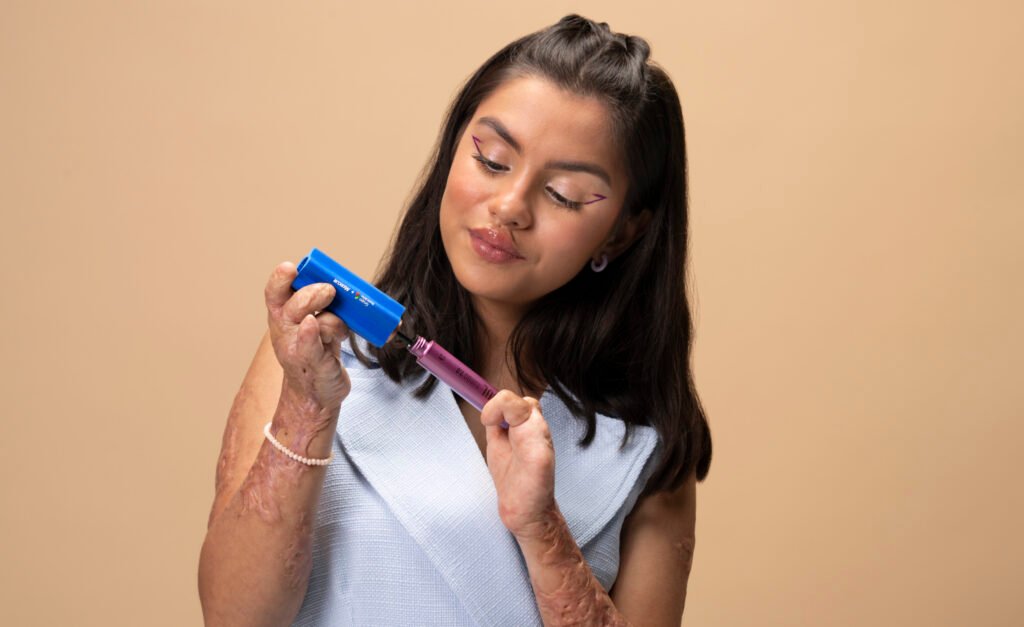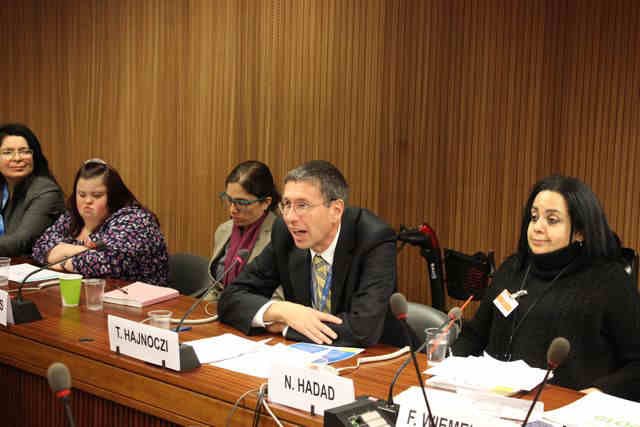
Activists for the rights of persons with disabilities made a strong point about the importance of providing the conditions for people with disabilities to fulfill their right to be independent and included in society, in a conference full of ambassadors, missions, UN staff, and other NGOs, on March 5, in the Palais des Nations, in Geneva.
The event “Independent Living for All: Towards Inclusive and Sustainable Societies” was organized by International Disability Alliance (IDA), a network of seven global and four regional organizations* of persons with disabilities and their families, and the Permanent Mission of Austria, together with the Permanent Missions of Australia, Brazil, China, Ecuador, Ethiopia, Finland, Mexico, New Zealand, Spain and Thailand, as well as the European Network on Independent Living, with support of the Zero Project, an initiative of the Essl Foundation in partnership with the World Future Council and the European Foundation Centre.
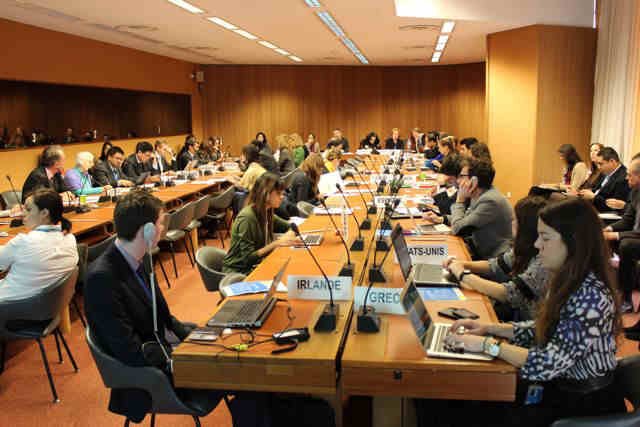
About 60 people attended the discussion, that was centered on Article 19 of the Convention on the Rights of Persons with Disabilities (CRPD), on the right to live independently and be included in their community. The Treaty was adopted in 2006 and ratified by 152 countries.
Ambassador Thomas Hajnoczi, Permanent Representative of Austria to the UN in Geneva, moderated the panel that was opened with a message from Ambassador Lenín Voltaire Moreno Garcés, UN Secretary-General’s Special Envoy on Disability and Accessibility, sent by video.
The fight against institutionalization and segregation of persons with disabilities, still a practice in many countries, is the most urgent point on article 19, in the opinion of Ms Catalina Devandas, the newly appointed Special Rapporteur on the Rights of Persons with Disabilities of the UN Council of Human Rights. She affirmed that the States should invest in the provision of services that are inclusive for persons with disabilities and that would allow them to participate on an equal basis with others in the community. “We need investment in those support services, both individualized services and mainstream services”, she said, also calling attention for the relation between article 19 and article 28, on the adequate standard of living.
Patricia Almeida, from the board of Trustees of Down Syndrome International, one of IDA’s members, shared the worries of families with children with disabilities about what would happen with them after they are gone. She showed a short clip from the documentary “What now, Joe?”, produced by Instituto MetaSocial and VideoBase from Brazil, about the need of provision of independent living for people with intellectual disabilities:

https://www.youtube.com/watch?v=DHzNDKpjB8A
WATCH THE CLIP OF THE DOCUMENTARY VIDEO CLICKING ON THE LINK BELOW
https://www.youtube.com/watch?
Ms Lisa McNabb, from Ireland followed with a presentation about her experience of living by herself in her own apartment. She explained that she is part of a project called “In Control”, that offers support to people with intellectual disabilities to have control over their own decisions. “My dream was to have my own apartment”, said Lisa, who also works at a supermarket and does sports in the community with some help. “I have a personal assistant called Janise. I interviewed her. She helped me prepare meals, do my laundry, do my weekly shopping, anything that I need. It’s great to work with Janise. She is funny, kind and she treats me like an adult.” Ms McNabb affirmed that she wanted to show everyone she could live on her own and be responsible. To conclude, she said: “I hope you spread the word so that others can realize their dreams because I am living mine”.
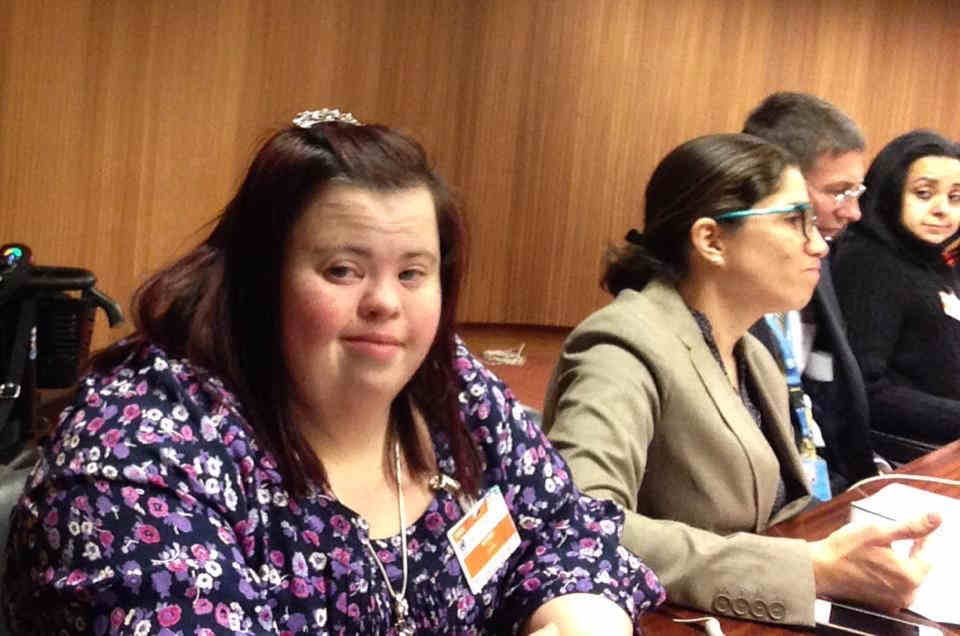
CLICK BELOW TO SEE MS MCNABB’S PRESENTATION
Next Ms Nadia Hadad, representing the European Network on Independent Living, a cross-disability rights organization working to spread the independent living philosophy and also on the implementation of CRPD, based in Brussels, talked about her work and personal experience. She said the Network has three mains goals: promote self-determination, fight institutionalization and try to emancipate people with disabilities “because as long as they don’t know that they also have abilities, it’s still difficult to come out, be part and participate in Civil Society”, she said. She mentioned that independent living is only possible through the combination of various environmental and individual factors that allow people to have control over their own lives. According to Ms Hadad, this includes the opportunity to make choices and decisions regarding where they live, with whom they live, how they live, and also the services that they want. In her opinion, the services should be personalized. Not only the houses, but also the environment should be accessible and it should be close to public transportation. “Technical aids, personal assistance and community-based services should be provided”, affirms the activist.
On her personal experience, Ms Hadad shared that she is an engineer and was 30 when, during her work on a social project in Senegal, she was in car accident and got paralyzed. She stayed 16 months in hospital, including one month in a coma. Back in Belgium, she said she couldn’t imagine herself going back to live with her family, but also refused to go to an institution. There was a long wait for services and it took 4 years for her to get a personal assistance budget: ” Once I had my personal asssistant budget, I employed people, so the money that the government gave me, I reinjected it in creating employment. So it went back to the society. And I went back to work as an engineer. I took up back my relationship with my boyfriend. So he came back, my boyfriend, my lover and not my assistant or my nurse. My family came back, family, we had normal relations, and not, I’m sorry, I need to go to the toilet, you help me, no, I had an assistant who could help me for those basic things. I could decide at which moment what I wanted to do, and for that I needed that personal assistance budget.”
Ms Hadad claims the right to live independently should be treated as a basic human right. According to her, for that to happen, disability should became a cross-cutting matter, not only social affairs or some specialty. There should be a paradigm shift and accessibility should be provided, not only physical, but also communicational, for all kinds of disability.
Nadia Hadad presentation: https://youtu.be/VOBsMggSb9s
Frédérique Wiemeijer, from Essl Foundation and Ingrid Heindorf, from World Future Council: The Zero Project, presented the project’s latest report with innovative policies and practices that enhance independent lives of persons with disabilities based on knowledge of a network of 3.000 disability experts in over 150 countries. Each year they focus their research on a particular theme or article of
the UNCRPD. This year it was independent living and political participation. Next year the subject will be inclusive education. The Zero Project also evaluates how the Convention is being implemented around the world through its social indicators.
A number of innovative practice were mentioned, from training of justice operators, lawyers, professionals and mental health and other authorities, to preventing guardianship, hospitalization and institutionalization of individuals with severe, mental and or psychosocial disabilities.
One of the innovative practices 2015 from Australia, closely involved all key stakeholders to develop guidelines on the notion of independent supported living, focused on adults with intellectual and developmental disabilities, with guidelines that can be adopted to all other vulnerable groups.
They found that of all community-based services, peer support is of crucial importance to enable persons with disabilities to live independently and to be include in the community. Numerous innovative practices and policies 2015 provide peer support in form of information and advice, empowerment, protection of interest and rights, training for independent living and peer council. The importance of peer support is still, by far, to many public authorities and service providers underestimated and such solutions remain essentially underfunded, they affirmed.
Some of our innovative practices 2015 belong to the area of assistive devices including technical aids, information platforms, assistive devices and innovative devices and assisted living.
Zero Project Presentation: http://youtu.be/IHEo_ScG8Rk
All 50 chosen projects can be found at Zero Project website – http://zeroproject.org/
The debate was open and many of the Ambassadors who supported the event congratulated the panelists, made comments about their own countries polices and asked questions.
New Zeland’s Permanent Representative, Ambassador Amanda Ellis, showed a book of activist Robert Martin, who has intellectual disability and helped change the world as an advocate of independent living.
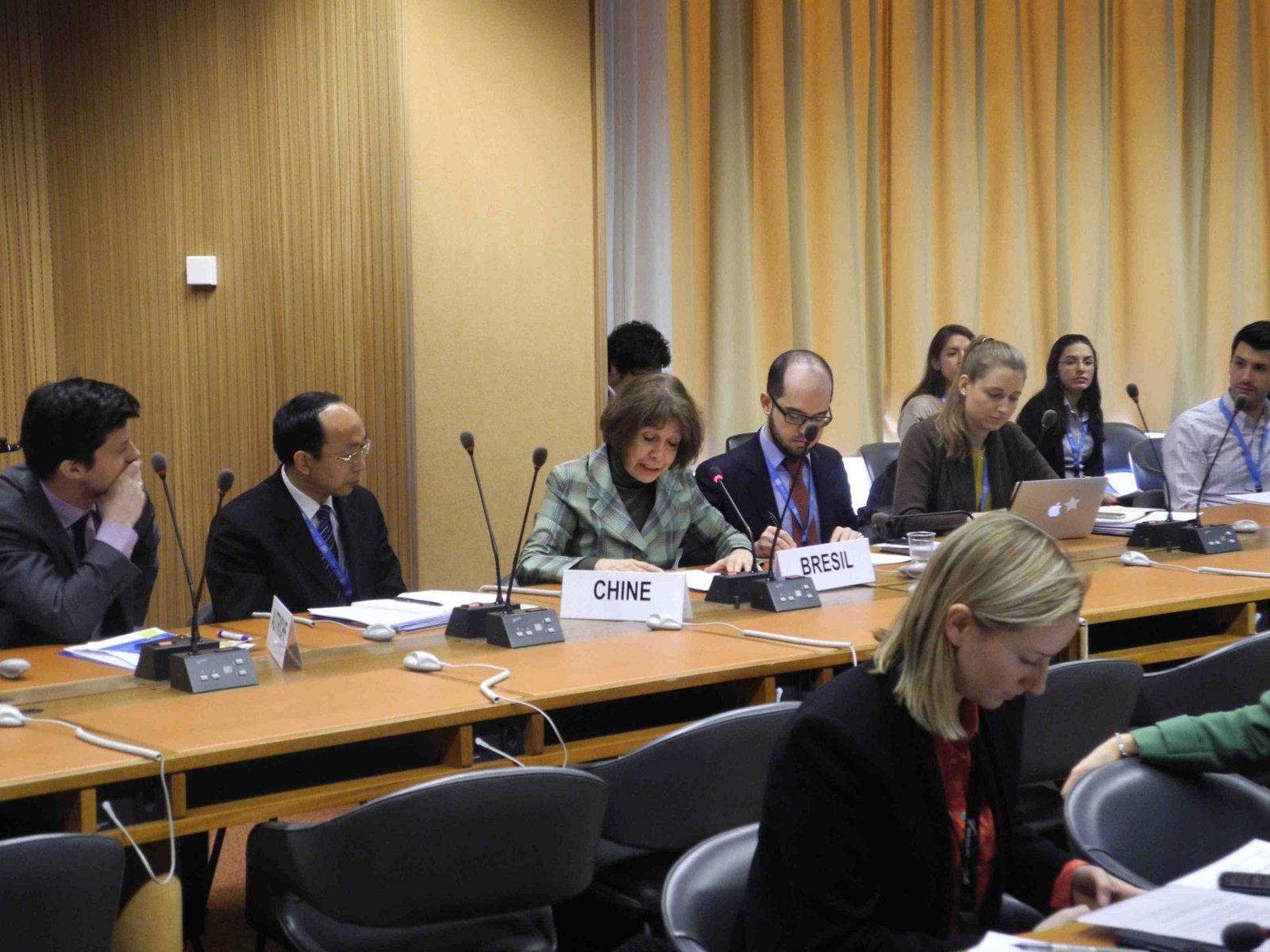
Ambassador Regina Dunlop, Brazil’s Permanent Representative to the UN highlighted the fact that in her country the Convention was adopted at constitutional level, which is the maximum level to this effect. She also said that Brazil has made great progress providing inclusive education for children with disabilities. She reminded the audience about the upcoming World Down Syndrome Day, 21/3, an opportunity to raise awareness about people with Down syndrome and intellectual disabilities, and stressed the importance of the partnership between governments, civil society and the UN to lift the barriers and promote social inclusion of people with disabilities.
Pictures of the event on the link below
# IDEFEND
After the event Ms Lisa McNabb participated on the campaign #idefend, an initiative of the Delegation of the European Union to the UN in Geneva in partnership with the Office of the High Commissioner for Human Rights and the Permanent Missions of Brazil, the Republic of Korea and Tunisia to the UN in Geneva.
The campaign aims to express solidarity with all those human rights defenders and civil society actors, whose dedication and everyday work improve the human rights of people in every corner of the world.
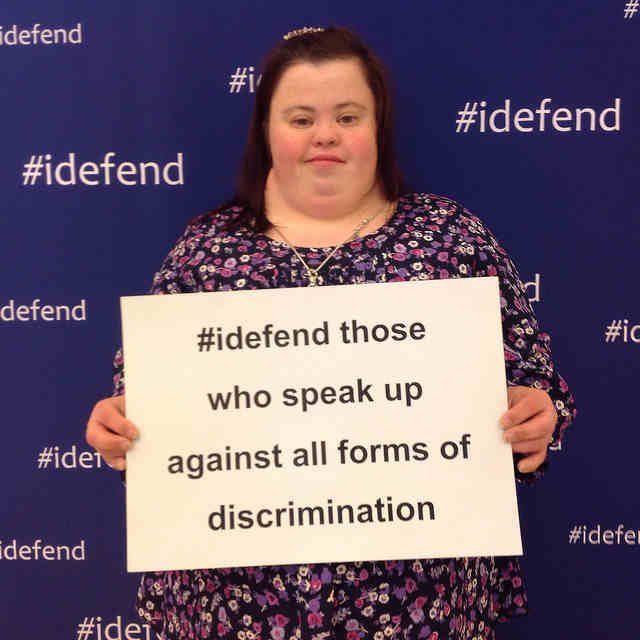
Everyone can join #idefend – wherever you are. Simply choose one of the #idefend slogans, take your photo and post it on Twitter or Facebook with the hashtag #idefend.
Who do you defend?
#idefend those who speak up for human rights
#idefend those who promote and protect women’s rights
#idefend those who are committed to the human rights of every
child around the globe
#idefend those who advocate for social and economic rights
#idefend those who speak up against all forms of discrimination
*IDA’s organizations:
Global DPOs
- Down Syndrome International (DSI)
- Inclusion International (II)
- International Federation of Hard of Hearing People (IFHOH)
- The World Blind Union (WBU)
- World Federation of the Deaf (WFD)
- World Federation of Deafblind (WFDB)
- The World Network of Users and Survivors of Psychiatry (WNUSP)
Regional DPOs
- Arab Organization of Persons with Disabilities (AOPD)
- European Disability Forum (EDF)
- The Latin American Network of Non-Governmental Organizations of Persons with Disabilities and their Families (RIADIS)
- Pacific Disability Forum (PDF)
Source: Inclusive

